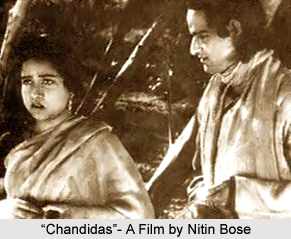 Nitin Bose, one of the notable film personalities, was born on 26th April 1897. He was an Indian film director, cinematographer and screenwriter of film industry. He was born in Kolkata. In the late era of 1930, he worked with New Theatres, who made bilingual movies. The films are in both Bengali language and Hindi language. Later, he moved to Mumbai and directed under the banners of Bombay Talkies and Filmistan.
Nitin Bose, one of the notable film personalities, was born on 26th April 1897. He was an Indian film director, cinematographer and screenwriter of film industry. He was born in Kolkata. In the late era of 1930, he worked with New Theatres, who made bilingual movies. The films are in both Bengali language and Hindi language. Later, he moved to Mumbai and directed under the banners of Bombay Talkies and Filmistan.
In the first phase of his career, he specially uses the playback singing in Indian films in the year 1935. At first in the year 1935, Bhagya Chakra, a Bengali film and later in the same year, in its Hindi remake "Dhoop Chhaon" made a smash hit at that time. His most well-known work is "Ganga Jamuna".
Early life of Nitin Bose
Nitin Bose was son of Bengali industrialist Hemendra Mohan Bose and Mrinalini Devi. Mrinalini Devi was sister of one of the famous Bengali writer Upendrakishore Ray Chauduri, who was father of poet Sukumar Ray. Nitin Bose had a great interest in nature and creative photography from his childhood. His father, who was a keen photographer himself, nourished his son`s interest in the same.
Nitin Bose as a Film Director
Nitin Bose`s first venture in film direction was a documentary film on Belgian Emperor`s visit to India in the year 1921. Nitin Bose started his film career as a cinematographer in 1926 in the movie Punarjanma. His debut as a cinematographer under the New Theatres Banner was in the movie "Devdas" in the year 1928. He was cinematographer of the only film directed by Rabindranath Tagore, "Natir Puja" (1932), which was based on a dance-drama composed by Tagore himself.
Nitin Bose worked closely with director Debaki Bose, but then Debaki Bose temporarily left New Theatres to Madan Theatres for making Sita (1934). At this time, producer of New Theatres, B. N. Sircar asked Nitin Bose to venture into film direction. Bose started with remaking of Debaki Bose`s "Chandidas" in Hindi (1934). It was a film based on Baru Chandidas.
In the year 1935, he made a film called Bhagya Chakra was the first Indian film to use playback singing. The singers were K C Dey, Parul Ghosh and Suprabha Sarkar. The movie was remade in Hindi with the title Dhoop Chhaon, which was the first Hindi film to use playback singing.
During the making of "Kashinath" (1943), Nitin Bose had a misunderstanding with B N Sircar. After completion of the film, he did not go back to New Theatres, with which he was associated since it was established in 1931. Eventually, Bose moved to Bombay and after that B. N Sircar closed New Theatres. Naukadubi (1947) was the first movie under Bombay Talkies Banner. Later it was remaked in Hindi as "Milan", in which Dilip Kumar acted in the lead role. His next film Drishtidan (1948) introduced Uttam Kumar, who later became grand icon of Bengali Cinema.
In 1960s, Nitin Bose directed a number of movies under the banner of Filmistan. Ganga Jamuna (1961), directed by Bose, is considered one of the all-time blockbusters of Indian Cinema. He did several cinemas like Buker Bijha (1930), Daku Mansur (1934), Didi (1937), Jiban Maran (1938), Dushman (1938), Dharti Mata (1938), Mujrim (1944), Mashaal (1950), Deedar (1951), Waris (1954), Jogajog (1958), Ummeed (1962), Nartakee (1963), Dooj Ka Chand (1964), Hum Kahan Ja Rahe Hain (1966) and many other films. He did cinematography in quite number of films like Dena Paona, Yahudi Ki Ladki, Didi, Desher Mati, Parichay and many others. He wrote a number of screen plays like Bhagya Chakra, Kashinath, Badi Bahen, Jiban Maran, Dharti Mata, Rajrani Meera and many other films.
Awards of Nitin Bose
Nitin Bose was awarded Certificate of Merit for Second Best Feature Film Pyaar Ki Pyaas. After that he received Dadasaheb Phalke Lifetime Achievement Award in 1977.
Nitin Bose passed away on April 14, 1986.






